Hussein Aboubakr Mansour
Mosaic, July 7, 2025
“Today’s Arab societies are not the product of a mass reconversion to Islam, but the mass conversion from it. Where Lewis focused on cultural resistance to modernity, I here focus on the opposite: modern Arab intellectuals grew enchanted by the most dangerous metaphysical structures of postmodernity.”
When, in the aftermath of the September 11 attacks and the onset of the Global War on Terror, the great historian Bernard Lewis asked, “What went wrong?” he gave voice to the defining anxiety about the Middle East. His 2002 book of that name distilled a lifetime of scholarship into a single question that seemed to cut through the confusions of both postcolonial apologetics and culturally despairing self-pity. Lewis articulated a mystery: how did a part of the world that once stood at the pinnacle of science, law, and geopolitical influence fall into authoritarianism, stagnation, terror, and despair? What had derailed the heirs of Ibn Rushd and Ibn Sinna, of al-Farabi and Ibn Khaldun?
Lewis’s question did not emerge in a vacuum. It was posed in the immediate aftermath of the September 11 terrorist attacks, when the West, its illusions of post-cold-war harmony shattered, was forced to confront the possibility that a vast swath of the world harbored deep, nihilistic hatred for it.
The proclamations of al-Qaeda declared not just a list of grievances but, supposedly, the final verdict of God: the West, and America in particular, are condemned. For many, this hatred was inexplicable. The jihadist was seen as a medieval relic or a nihilistic anomaly. Lewis offered a framework that gave this rage coherence: it was the fury of a civilization that had fallen behind and, shamed by the remembrance of its former glory, blamed its decline on external forces. In one short volume, he translated the blood and fire of jihadism into the language of historical development, institutional failure, and cultural woundedness. ….SOURCE


